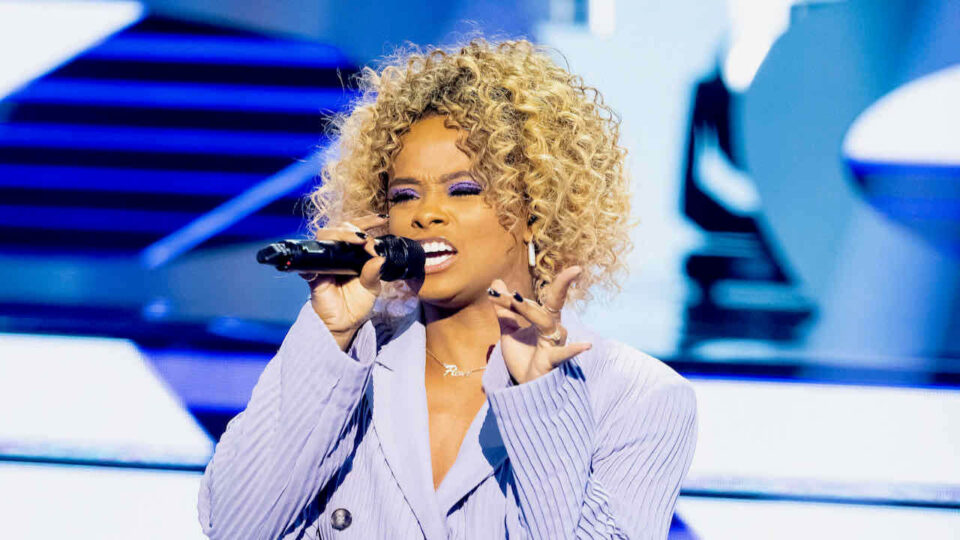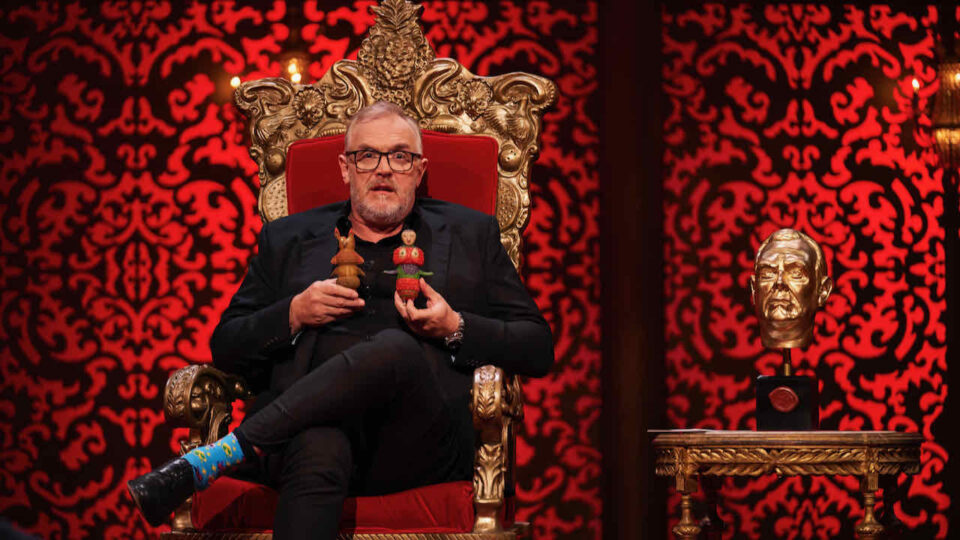Entertainment TV has found a new lease of life, with several new big hits across the schedules and a feeling that there’s more to come. Tim Dams reports
Taken from Televisual’s Summer issue
Despite – or perhaps because of – the challenges of the pandemic, the spotlight is firmly on the entertainment genre.
With people forced to stay at home, they gathered together around their televisions to watch positive, uplifting, escapist and above all entertaining fare amidst the depths of the Covid crisis. Five of the top 10 rating shows of 2020 were unscripted: I’m A Celebrity, Strictly Come Dancing, Great British Bake Off, Britain’s Got Talent and Saturday Night Takeaway.
“I would say lockdown has probably been beneficial for the genre,” says James Townley, global head of content development at superindie group Banijay. “There’s been lots of family co-viewing like you had 20 years ago for big Saturday night entertainment shows.”

A hits business
The clear audience appreciation for entertainment has led many broadcasters and streamers to double down on the genre.
They’ve also been encouraged by the success of new formats. The February grand finale of the second series of ITV’s The Masked Singer peaked with a whopping 10.6million viewers as Joss Stone was unmasked as Sausage and won the series
Meanwhile, Netflix co-CEO Ted Sarandos hailed Too Hot to Handle as its “biggest competition show ever” after the series premiered last April, soon before ordering another two series of the Talkback-produced show. Too Hot to Handle was named as Netflix’s most-watched show in 10 countries by Wall Street analyst Bernstein Research.
For years, entertainment has been eclipsed by drama as the most dynamic and talked about genre in TV. Many say it suffered from a marked lack of innovation and risk taking, instead being reliant on long running brands that have dominated the schedules for 20 years.
Even before the pandemic, however, this was changing. New shows such as The Masked Singer and the BBC’s The Wall, as well as Channel 4’s poaching of Taskmaster from UKTV, demonstrated the ambitions of broadcasters in the genre.
More recently, a slew of new shows have launched. Following the success of Masked Singer, guessing formats are one of the big new trends, as seen in shows such as BBC1’s I Can See Your Voice and ITV’s Game Of Talents. The guessing trend has extended to factual entertainment too, notably BBC One’s This is My House.
Nostalgia is big too. Blankety Blank is being rebooted for BBC One with Bradley Walsh hosting, while Family Fortunes returned last year with Gino D’Acompo as host and Alan Carr’s Epic Game Show reworked versions of past ITV game shows.
Dating and reality is also a major focus for many broadcasters and streamers following the recent success of Netflix’s Too Hot to Handle and Love is Blind.
“It feels like there’s a real resurgence of entertainment,” says Derek McLean, co-founder of The Masked Singer producer Bandicoot, part of the Argonon group. “It does finally feel like there are some new big shows landing that might be with us for a while.” His Bandicoot co-founder Daniel Nettleton adds: “We worked through a real lull period about five years ago, when all the chat was about what’s the next X Factor. Saturday night television became pretty stale…but right now entertainment TV is in a really good place.”
Ed Sleeman, the co-founder of All3Media-backed Great Scott Media and former md of Fremantle label Talkback, says there is a real thirst for entertainment. He and his colleague Leon Wilson exec produced Too Hot to Handle before leaving Fremantle to set up Great Scott last year.
Sleeman says that commissioners are now looking to take advantage of lockdown easing to create new content. “We’ve never felt more in demand,” says Sleeman. From a standing start last year, Great Scott will have about 150 people on its payroll by August working on three new shows.
Phil Harris
Channel 4, Head of entertainmentWhat’s the entertainment market like at the moment? There have been a lot of rolls of the dice in entertainment. What is encouraging is that there are some big new formats beyond the Got Talent or X Factors – shows like Masked Singer are really encouraging everyone. It has been a really tricky year to get new stuff going. What people managed to do incredibly well was adapt formats to audience-less environments. We did it with Taskmaster – it definitely wasn’t how we imagined launching Taskmaster on C4. We had brilliant ratings for returning brands like The Last Leg, Big Fat Quiz and Bake Off. Viewers we’re reaching for something familiar. But it has been really hard. Now we’re seeing the green shoots of shows that we’ve been preparing for the last year coming to fruition.
Is C4 focusing more on entertainment? As [director of programmes] Ian [Katz] has said we want to bring the viewers some joy in a joyless age. We’re a natural place where viewers can experience that through brilliant comedy entertainment. We want stuff to be mainstream, but have an innovative twist to it and a distinctiveness. We’re not just looking at things that will perform on linear, we are looking at things that can burn brighter and longer. Taskmaster does really well in linear, but because there is a returning cast who you get to know and there’s a winner, the viewer can watch on catch up and get a satisfying narrative. Things like that feel really on brand, have great talent but can still cut through on All4.
You’ve said you are looking for a 9pm reality series? It feels like there could be space for a big, broad, possibly celebrity driven show that has proper narrative, and scope for humour, and drama and character reveals. We’ve done brilliant things like The Jump and Sink or Swim. The Jump was fabulous…but it was almost more of a challenge show with VTs, as opposed to a narrative reality show that has stories threading off. We’re probably looking for a bit more of the latter.
The new gold rush
Indeed, there’s a sense that after the hiatus of 2020, entertainment production is really gearing up this summer. Sleeman says he recently interviewed a reality producer to work on one of Great Scott’s new shows, and she had turned down eight dating reality shows in the last two weeks. “If you’re any good and you work in reality and you’re not currently on a show, you’re basically a unicorn,” says Sleeman. “These people can take their pick.”
The push by streamers into entertainment has also spurred demand for content from entertainment focused indies. “We are having so many more chats with the streamers about what entertainment might look like – how you take the traditional studio entertainment show and put it on a service that is designed for bingeing box sets,” says Bandicoot’s Nettleton.
Of the streamers, Netflix is widely seen to be leading the entertainment charge. The streamer is rebooting BBC Three/A&E dating show Sexy Beasts, while The Circle producer Studio Lambert is making competition series Jet Set (working title) and a dance show, working titled All The Right Moves, which aims to uncover a superstar choreographer.
But Amazon is pushing into entertainment too. Amazon recently greenlit a local version of The Masked Singer in Japan, and last year played a French version of Love Island, which wrapped early because of coronavirus. HBO Max and Peacock are among other streamers that UK indies have recently been pitching entertainment ideas to.

Linear channels, however, remain key players in the market. At a time of spiralling drama budgets and when broadcaster revenues are under pressure, entertainment is the place to go for a cost effective way to win audiences.
Entertainment can also appeal to a broad range of audiences – and therefore big numbers of viewers – making them attractive to broadcasters. Crucially, live entertainment plays to the strengths of traditional broadcasters, and differentiates them from the streamers.
Channel 4 head of entertainment Phil Harris says many plans had to be put on hold during lockdown. “We’re coming out of this period of development hibernation, and maybe of more safety in terms of our choices.” During the pandemic, he points out that broadcasters and producers didn’t have the ‘bandwidth’ to experiment and innovate – but now people are ready to try new things.
Channel 4 is set to return to dock10 studios in Manchester later this autumn to pilot a number of panel shows. The broadcaster has booked the studio space following an innovative run-through programme last year which Harris introduced to develop ideas in an affordable and sustainable way from a range of independent production companies from around the country.
As part of the initiative, the broadcaster tested seven primetime quiz ideas in a short window with two ideas being commissioned for full series. One of them, Quizness fronted by comedian Tom Allen, is produced by CPL Productions.
Harris is also on the hunt for a 9pm celebrity-driven reality show (see box), as part of its £30 million Global Format Fund initiative.
This underlines how traditional broadcasters are preparing to experiment on a bigger scale now that lockdowns are easing.
The same is true at ITV. Recent commissions include Starstruck, created by Banijay UK company Remarkable Television, which sees members of the public with an exceptional talent team up to transform into music icons such as Amy Winehouse, Lady Gaga and Marvin Gaye and compete for a cash prize.
Meanwhile, Gameface Productions’ new Saturday night ITV game show – The Void – sees contestants take on demanding mental and physical challenges – all whilst navigating The Void – a chasm of 520,000 litres of water stretching across the arena floor in one of the biggest bespoke water tanks ever constructed for a game show.
With society starting to open up again, ITV head of entertainment commissioning Katie Rawcliffe says that the broadcaster is on the hunt for “bigger” propositions. “What’s the next I’m a Celebrity? What is the next big reality format for us? What is the next big shiny floor show? We are looking for the next big thing.”
As an indication of ITV’s ambition, Simon Cowell is to return to the channel in Walk The Line, a brand new musical game show format co-produced and co-developed by Syco Entertainment and Lifted Entertainment, part of ITV Studios.
The six-part series will debut on ITV later in the year, offering musical variety acts a chance to win a “life changing prize pot.” But to win the money, talent alone isn’t enough – the contestants will have to decide whether to cash out or physically walk the line and risk it all to stay in the competition.
Katie Rawcliffe
Head of Entertainment Commissioning, ITV
How is the entertainment market at the moment? There’s loads of demand. We always want broad, family, massive audience [shows]. In the current landscape, that’s got to be our USP. We can still bring people around the TV set together, especially with those big, live, stripped shows like I’m A Celebrity, BGT and Masked Singer. They create a conversation. We are looking for the next big version of that.
What has worked well for you recently? In the pandemic we launched Beat the Chasers, in a strip at nine o’clock. That was about engagement – bringing people in to take part in something. We’ve done quite a bit of quiz and game. Nostalgia still works and is something we’re interested in. Family Fortunes did brilliantly with Gino. People know the format, they can grab on to it and don’t have to think too hard to watch it – and Gino brings something to it. Catch Phrase is another one. It doesn’t waver. It’s about familiarity, and proper family entertainment. And the Epic Game Show – it’s very familiar looking but with an original spin.
What are you looking for? We’ve just come out of the studio with several things, which show you what we’ve been looking at. Starstruck gives you the nostalgia of Stars in Their Eyes but with a brand new spin. There’s a guessing element to it…it’s got brilliant transformation…it’s got the nostalgia, but it feels really contemporary in the way it is staged. We’ve just finished doing a big physical game show The Void. It’s dead simple but really strong in terms of what the producers, Gameface, have brought to it. Through the pandemic, we have looked at a lot of new games, a lot of quiz. We’ve got some things coming that we’re going to record in that area. But now it’s all opened up a bit, I think it’s about the bigger proposition. People have been looking for this for years, but what is the next I’m a Celebrity? What is the next big reality format for us? What’s the next big shiny show? We are looking for the next big thing.
Old favourites
Not everything is about the new though. Banijay’s James Townley says many of the ‘super brands’ made by its more than 120 labels worldwide are proving resilient. He cites MasterChef through to Big Brother, Survivor and Temptation Island which are all playing around the world. Wipeout has also returned in the US, while Banijay added classic format Name that Tune to its catalogue earlier this year. The traditional gameshow re-launched on Fox in the US in January, and has just won an order from Sat.1 in Germany.
“Broadcasters want them, because they know that they slightly reduce the risk because there’s a guarantee to the audience,” says Townley. During lockdowns, broadcasters also turned to established formats that they knew how to make as the safest options for shooting.
Banijay is also focusing on the new. The superindie group has an internal creative fund that is focused on “supercharging” its development pipeline, according to Townley, and recently did a call out with its producers to send through initial development ideas from which it could pick a number to “get behind and support.”
Echoing fellow producers, Townley says unscripted is “very, very bubbly” at the moment, with demand from both streamers and broadcasters.

That’s not to say it’s an easy market for producers to crack though. “Breaking through is a hard as it has ever been – it is so competitive,” says Townley. “Anyone who gets a new commission away or a recommission deserves a gold star.”
There are also different dynamics at work in the entertainment market to take account of. Traditional broadcasters are increasingly thinking about how their entertainment offer can live on on their catch up platforms. The pitching process is skewing in favour of producers that can work up tape rather than paper proposals. Competition for talent – both on and off screen – has intensified. Producers are also coming to terms with a new business model which sees global streamers buy out the IP on shows, meaning they risk reverting to a work for hire model. Meanwhile, traditional broadcasters which allow producers to hold on to rights might not be able to offer a budget that matches their ambition for a show.
Indeed, the ambition for entertainment really seems to have picked up. The experience of Covid-19 also seems to have influenced the thinking of many indies. During the pandemic, many shows filmed without studio audiences – causing some producers to think out of the traditional studio box.
Masked Dancer, for example, filmed its launched season without a studio audience. “It’s really allowed us to think how entertainment shows could be done differently,” says McClean. “How big can we go with an entertainment show? How do we do this in the real world? Why do we need the studio?”
From augmented reality to social media, producers like Bandicoot are also thinking hard about how technology can best be incorporated into shows.
Amid heightened competition for the best ideas from both broadcasters and streamers, innovation in entertainment seems very much on the agenda. Saturday night is unlikely to be the same in years to come.
Jon Creamer
Share this story


















